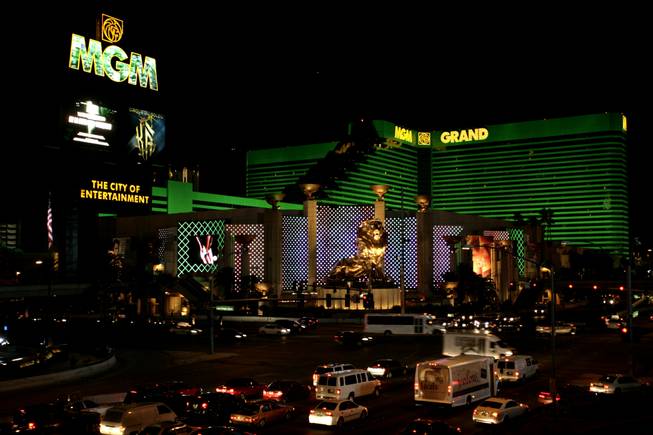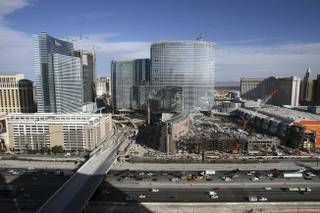Tuesday, April 7, 2009 | 2 a.m.
Sun Archives
- MGM Mirage hires investment firm (4-4-09)
- Australian businessman weighing CityCenter investment (4-3-09)
- CityCenter contingency plan emerges; investor shows interest (3-28-09)
- CityCenter safe — for now (3-28-09)
- In a recession, a delay could be seen by rivals as a positive development (3-28-09)
- Shutdown would leave few other options for many in construction (3-28-09)
- A financial history of the CityCenter project (3-28-09)
- Letter sent to MGM Mirage employees from CEO James Murren (3-27-2009)
Close Call
MGM Mirage rescues its CityCenter development from the brink of default. In Business talks with LasVegasSun.com reporter Steve Green about the project's outlook.
Sun Coverage
Beyond the Sun
When MGM Mirage negotiated a $7 billion financing package with its banks in 2004, the company was worth more than $10 billion and was about to swallow one of its largest competitors on the Las Vegas Strip, creating a triple threat with an impressive cross-section of casinos at a time when tourism was booming.
The company was in such a powerhouse position that banks didn’t ask for any collateral at the time.
As a result, these banks don’t have collateral in MGM Mirage’s casinos, removing the key threat of foreclosure that many banks have over businesses in the economic crisis.
That’s one reason why these bankers have been so accommodating with MGM Mirage in recent weeks. In fact, they’re moving in the other direction, offering MGM Mirage even more time to sort out its finances.
Lately, they have agreed to waive certain financial requirements that were imposed in exchange for the $7 billion loan, giving the company, which needs to reduce its $13.5 billion debt load, until May 15 to figure out a plan.
That’s a costly concession, as parts of that loan are traded in the market like other investments and are now worth less based on the company’s ability to repay. The banks may agree to extend that deadline, furthering negotiations with lenders, or they might demand their money.
They have reason not to pull the trigger.
Were the gaming giant to seek bankruptcy protection, the banks would have no advantage over bondholders in recovering their investments. Typically, banks are repaid first in bankruptcy because their debts are secured by assets, followed by unsecured creditors.
But not in this case.
Banks struck the $7 billion deal with MGM Mirage during a boom time when there was little fear of bankruptcy.
Such a deal wouldn’t happen today, with banks reluctant to lend money to casinos reeling from the recession. At the least, banks releasing money are seeking more security in return. In November, for example, MGM Mirage raised a chunk of cash by selling $750 million in bonds guaranteed by a lien against the company’s New York-New York resort as collateral.
As MGM Mirage faces dwindling options in an attempt to stay out of bankruptcy court, perhaps the most important bargaining chip at the company’s disposal is collateral in its casinos, experts say.
Granting this collateral, they say, could buy MGM Mirage more time to find a solution to its cash crunch.
On that point, private equity firm Colony Capital has expressed interest in investing in MGM Mirage in exchange for assets, Bloomberg News reported Monday.
MGM Mirage also is considering selling properties to raise cash.
But a strategy of selling casinos is anything but simple to execute.
The company is facing off against two potential masters — bankers and bondholders — with competing interests. Pleasing one side might offend the other, and vice versa.
Both groups of lenders — owed billions of dollars — have the power to push MGM Mirage into bankruptcy court. But these groups, at least in the near term, are unlikely to demand repayment in a way that would force the company to file for bankruptcy protection because they could end up having to compete for the company’s assets.
With lenders standing back, MGM Mirage may choose to file for bankruptcy protection to restructure its debts if it can’t reach an agreement among various lending groups, analysts say. Bankruptcy reorganization is not only a way of reducing a company’s debt to a manageable level but also a way to force decisions, with a judge playing referee.
In theory, one scenario appears to hold the most promise for MGM Mirage: The company could grant bondholders some collateral in return for giving bondholders new notes worth less money and with longer maturity dates. Bondholders might bite if they’re counting on an eventual recovery, the alternative being that they are skunked if the company’s finances worsen.
Highly leveraged casino companies, including Station Casinos and Harrah’s Entertainment, are pursuing that strategy to reduce debts by billions of dollars.
Giving bondholders some collateral would help MGM Mirage by potentially delaying the need to repay more than $1 billion in bonds due for repayment this year.
Several analysts believe MGM Mirage is better served by granting collateral in its casinos than by selling them.
In a research note to investors last week, Barclays Capital stock analyst Felicia Hendrix said MGM Mirage has little incentive to sell casinos to raise cash because sale prices would likely be depressed and because the company would likely have a big tax bill on the gain if it were to sell any of its Strip properties, which have risen in value since they were acquired.
Giving collateral to bondholders doesn’t help banks, which also want collateral.
Yet giving banks collateral doesn’t help bondholders that are owed money.
A more complicated scenario would involve splitting collateral and cash between banks and bondholders. Negotiating that split might be all but impossible, analysts say.
Rather than hold out for an economic rebound, bondholders might demand repayment of $227 million in bonds due in July and another $821 million due in October. Another $1 billion comes due next year.
To complicate the situation: Some bondholders are involved in MGM Mirage’s bank loan. The banks might agree to give bondholders more to sweeten a deal if it keeps MGM Mirage out of bankruptcy court — which could help both lending groups.
That’s not all. Some of the same banks have lent $1.8 billion to finance CityCenter — more than $1 billion short of what MGM Mirage hoped to receive from the banks to finish the project in partnership with Dubai World.
If the company files for bankruptcy protection, that could trigger a bankruptcy filing for the CityCenter partnership. That might not help lenders if their money goes to paying off contractors first.
The loans were structured that way because, once in bankruptcy court, MGM Mirage might be prevented from putting additional money into CityCenter.
Whether the banks could recover money already drawn by the CityCenter partnership if the project files for bankruptcy protection is another big question that analysts say probably won’t be answered until the decision is made to file under Chapter 11.
MGM Grand, a AAA Four Diamond resort, offers 5,044 rooms and suites.
MGM Grand features KÀ by Cirque du Soleil; Brad Garrett’s Comedy Club; and world-class entertainment at the Grand Garden Arena and Hollywood Theatre.
The resort offers signature restaurants by celebrity chefs including Tom Colicchio’s Craftsteak, Emeril Lagasse’s New Orleans Fish House, Wolfgang Puck’s Bar & Grill and Michelin three star and Forbes Five Star restaurant, Joël Robuchon.
As part of its ongoing “Grand Renovation,” MGM Grand has remodeled all rooms and suites in its main tower and is adding several new experiences to its lineup including Hakkasan Las Vegas Restaurant and Nightclub, a new upscale dining/nightlife concept (coming in April 2013).
MGM Grand also features a state-of-the-art, non-smoking conference center, the Grand Spa, Cristophe Salon, "CSI: The Experience" and an inviting pool complex featuring the tantalizing daylife of Wet Republic.
Upscale accommodations include The Mansion, an exclusive hotel within the hotel; the luxurious two-story SKYLOFTS at MGM Grand; and The Signature at MGM Grand, a luxury all-suite, non-gaming hotel located adjacent to the main resort.



Join the Discussion:
Check this out for a full explanation of our conversion to the LiveFyre commenting system and instructions on how to sign up for an account.
Full comments policy